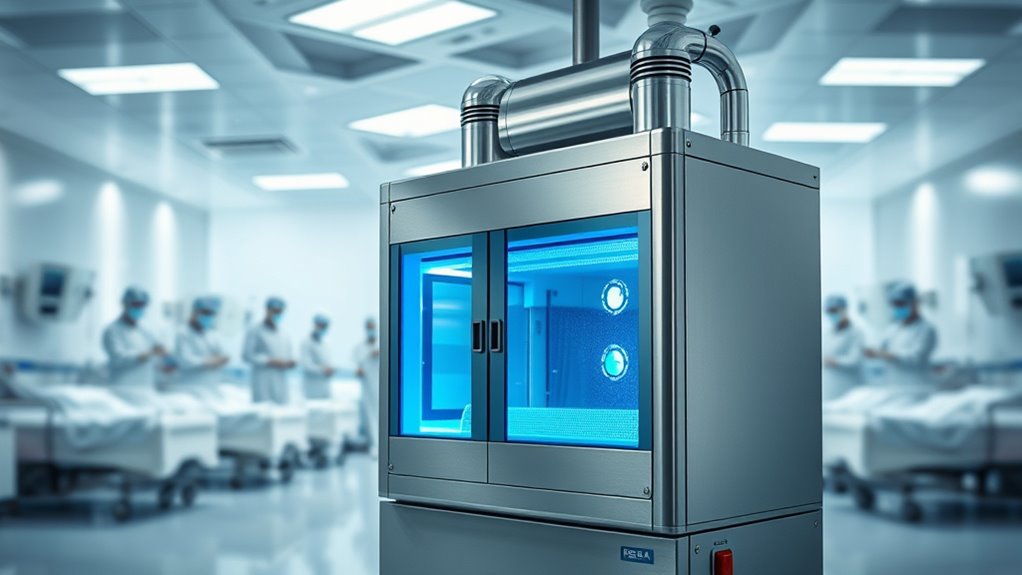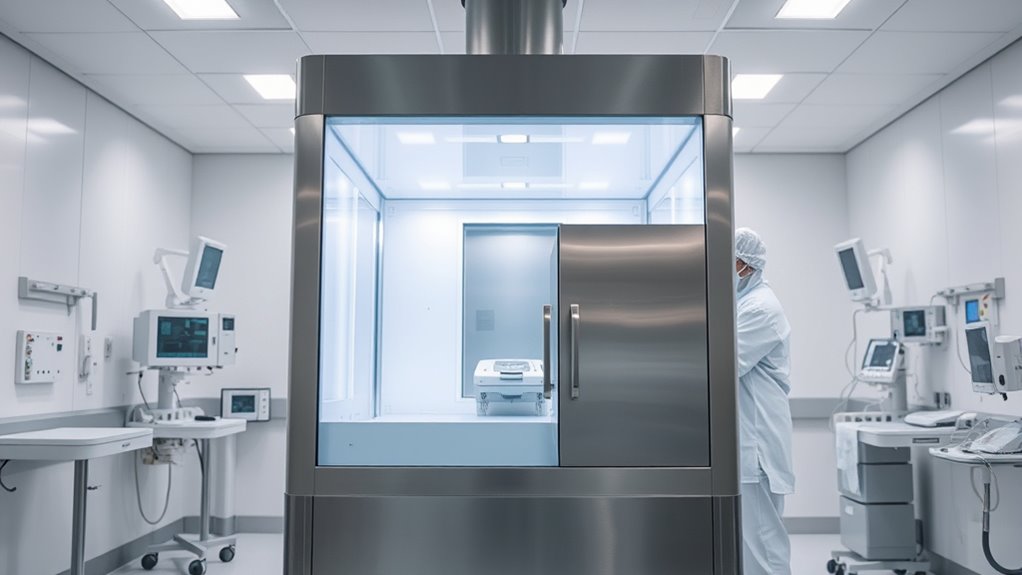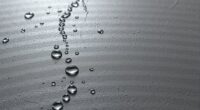Hospitals prefer HEPA-integrated scrubbers for isolation wards because they reliably capture over 99.97% of airborne particles, including bacteria and viruses. This high efficiency keeps the environment sterile, reducing infection risks for patients and staff. HEPA scrubbers also improve air quality continuously and are easy to maintain. If you explore further, you’ll discover how these systems support compliance with health standards and strengthen infection control practices.
Key Takeaways
- HEPA scrubbers effectively remove airborne pathogens, reducing infection spread in sensitive isolation ward environments.
- Their high filtration efficiency ensures compliance with health safety standards and regulations.
- Mobile HEPA scrubbers allow strategic placement for optimal air purification during procedures.
- Easy maintenance and quick air clearance support ongoing infection control efforts.
- They enhance overall hospital safety, protecting vulnerable patients and healthcare staff from airborne hazards.

Have you ever wondered how hospitals maintain a safe environment for patients and staff? One essential component is the use of advanced air filtration systems, particularly in sensitive areas like isolation wards. These wards require stringent infection control measures because they host patients with contagious illnesses or compromised immune systems. HEPA-integrated scrubbers play an important role here, ensuring that the air circulating within these spaces is clean and safe. By effectively capturing airborne particles, including bacteria, viruses, and other pathogens, these scrubbers markedly reduce the risk of infection spread. Proper air filtration is indispensable not only for patient safety but also for protecting healthcare workers who are constantly exposed to potential hazards.
Hospitals have adopted HEPA-integrated scrubbers because they provide a high level of filtration efficiency. HEPA filters are designed to trap at least 99.97% of particles as small as 0.3 microns, making them highly effective against airborne microbes. When integrated into scrubbers, these filters create a continuous cycle of air purification, removing contaminants before they can circulate and cause infection. This constant filtration enhances infection control protocols by maintaining a sterile environment in the ward. The scrubbers are often mobile, allowing staff to position them strategically around the room, optimizing airflow and ensuring that contaminated air is quickly and efficiently removed. This flexibility is especially important during procedures or when new patients are admitted, as it minimizes the risk of airborne transmission.
Furthermore, the use of HEPA-integrated scrubbers supports hospital efforts to comply with strict health and safety regulations. They help meet standards set by health authorities for air quality and infection prevention. In addition, these systems are relatively easy to maintain, with regular filter replacements and system checks ensuring consistent performance. Their contribution to infection control is invaluable, especially during outbreaks or when managing highly infectious diseases. Hospitals recognize that investing in reliable air filtration systems like HEPA-integrated scrubbers directly correlates with improved patient outcomes and staff safety. The peace of mind that comes with knowing the air in critical areas is constantly being purified allows healthcare providers to focus on delivering quality care without unnecessary worries about airborne infections.
A high-efficiency filtration system is essential to maximize the effectiveness of these scrubbers and ensure optimal air quality in sensitive hospital areas.
Frequently Asked Questions
How Do HEPA Scrubbers Compare to Traditional Filtration Methods?
You’ll find HEPA scrubbers outperform traditional filtration methods by providing superior air quality, capturing 99.97% of particles down to 0.3 microns. They’re more cost-efficient in the long run because they reduce infection risks and maintenance costs. Unlike basic filters, HEPA scrubbers guarantee cleaner, healthier environments, especially in sensitive areas like isolation wards, making them a smarter choice for maintaining ideal air quality efficiently and economically.
What Maintenance Is Required for Hepa-Integrated Scrubbers?
You need to regularly check your HEPA-integrated scrubbers to maintain filtration efficiency. The maintenance frequency depends on usage, but typically, you should replace filters every 6 to 12 months and clean the units weekly to prevent dust buildup. Also, inspect for any damage, and ensure fans and motors are functioning properly. Proper maintenance keeps your scrubbers running efficiently, guaranteeing peak air quality in isolation wards.
Are HEPA Scrubbers Effective Against Airborne Viruses?
You wonder if HEPA scrubbers are effective against airborne viruses. They excel at airborne particle removal, filtering out tiny virus-laden particles efficiently. With high virus filtration efficiency, these scrubbers trap and contain airborne pathogens, reducing infection risks. Their powerful purification process clears the air of harmful viruses, making them an essential tool in maintaining safe, sterile spaces. So, yes, HEPA scrubbers markedly improve airborne virus control.
What Is the Average Lifespan of a Hepa-Integrated Scrubber?
You’ll find that the average lifespan of a HEPA-integrated scrubber ranges from 5 to 10 years, depending on air filter durability and how well you maintain the equipment. Regular filter replacements and proper servicing extend its equipment longevity, ensuring reliable performance. Proper care is essential to maximize the scrubber’s lifespan, so follow the manufacturer’s guidelines for maintenance and filter changes to keep it functioning effectively over the years.
How Do HEPA Scrubbers Impact Energy Consumption in Hospitals?
Think of HEPA scrubbers as the heart of hospital air quality, silently working to keep germs at bay. They impact energy consumption by balancing energy efficiency and power consumption, ensuring the hospital runs smoothly without excessive energy use. Modern HEPA scrubbers are designed to optimize airflow and filtration, helping hospitals save on energy costs while maintaining a safe environment. You’ll appreciate their role in creating a healthier, more sustainable space.
Conclusion
Choosing HEPA-integrated scrubbers is like having a vigilant shield guarding your hospital. They efficiently trap airborne particles, ensuring a safer environment for patients and staff alike. Their ease of use and reliable filtration make them the go-to choice for isolation wards. Just as a sturdy fence keeps unwanted visitors out, these scrubbers keep harmful pathogens at bay, giving you peace of mind and fostering a healthier space for everyone inside.









